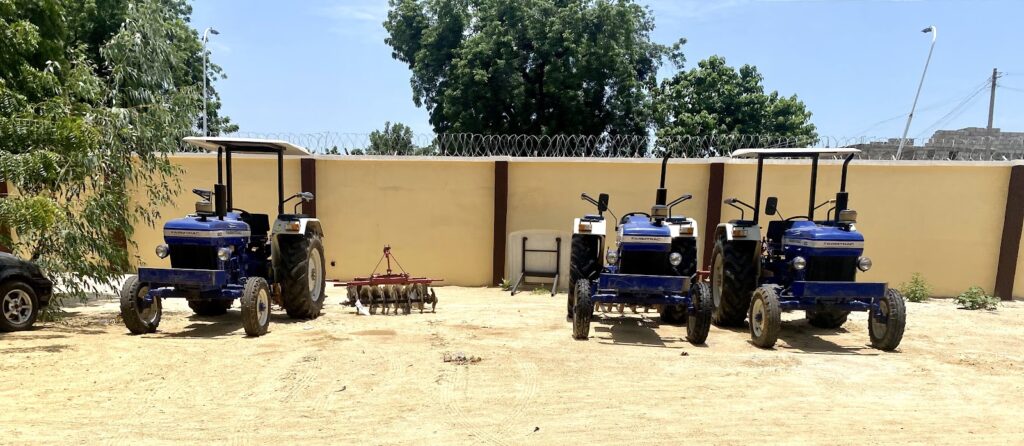Farmers trying to hire equipment that is meant to be loaned out cheaply to help them produce more food, are instead having to fork out high rental prices, and someone along the line is pocketing the cash, farmers have told HumAngle.
The state government of Borno, in North East Nigeria, recently announced a scheme to help increase productivity, produce more food and stave off hunger by providing cheap tractors to farmers. This was an important intervention as the state, the epicentre of the Boko Haram insurgency, has suffered significant blows even in the agricultural sector, especially in the past few months which have seen farmers come under attack, further reducing the number of people willing to risk farming in certain areas.
But when they tried to get a tractor, farmers found it was not available.
“The tractors we pay to plough our farms are the government tractors with government plate numbers, the same tractors the governor gave farmers in every local government to access by just fueling, we hire at a commercial rate,” said Abba Gana.
Abba Gana’s farm is in Gede, a farming community in Jere, about 67 km from the state capital, Maiduguri. When he requested access to the tractor in Jere local government secretariat, he was told that the tractors were already working in the field. After trying for some time, he realised the excuses were a ploy, he wasn’t going to get it for free.
“I have to pay ₦85,000 ($112) for my 10 hectares of land to be ploughed by the government-issued tractor. I will not have paid even half of that fee if I am to fuel the tractor just like the governor said,” Abba Gana sadly added.
The scheme
On June 13, the Borno state governor, Babagana Umara Zulum, flagged off sales of fertilisers to farmers at a 25 per cent discount from the market price. The subsidised fertilisers are to be sold to farmers only. A tractor was given to each of the 312 wards of Borno state to be sold at a 50 per cent discount to farmers’ unions paid over five years.
Additionally, five tractors were entrusted to every local government, headed by the local government chairmen, All Progressives Congress (APC) party chairmen, and the heads of agriculture of every local government.
All farmers had to do, according to the scheme, was pay for the fuel.
But farmers from Maiduguri, Jere, Bama and Konduga told HumAngle they did not have access to free tractors. In order to get one, they had to pay the same price as when renting a commercial tractor.
During the scheme’s flagging-off ceremony, the governor gave a stern warning that any official, big or small, would be punished if found diverting the resources.
Governor Zulum said: “People should be careful, these are the properties of the poor man. Anyone found diverting it will face severe consequences, if anything happens you are on your own. Nobody should say Bana Umara [the governor of Borno state] has arrested me.”
Despite the stern warning, it appears officials in charge have chosen to defy orders and proceeded with their plans.

Posing as a farmer, a HumAngle reporter visited the Maiduguri secretariat to request a tractor. For three days, he was turned away every time he came.
Later, our reporter was told the director of farms was not around and all requests were to be directed to him. The reporter was asked to drop his phone number so that he would be contacted if the director came back. No call was received.
The financial burden placed upon the farmers for ploughing their lands using a supposedly government-provided tractor contradicts the very essence of the initiative. Instead of reaping the benefits of discounted resources, farmers say they find themselves grappling with unexpected costs, dampening their hopes of improving their agricultural yields. Instead of opening up the land to production, it limits the amount of land that can be cultivated.

In Bama, Shettima Abba said, “I have been a farmer for over five years, and every year, we get such promises of discounted tractors but they never reach us.”
Modu Kura, a farmer from Konduga, expressed his concerns about the high cost, time constraints, and risks associated with hiring labourers to plough his land. He emphasised that not only is it expensive, but it also consumes a significant amount of time and exposes farmers to the threat of Boko Haram attacks. The longer one stays on the farm, the more vulnerable they become.
“We pay ₦9,000 ($12) per hectare to plough our land, the blue tractor the government provided is the only tractor that is available for hire in Konduga. If you know the officials, you will get some discounts. Otherwise, you have to use labourers, which is not sensible,” said Bana Kura.
This year, Kura noted that labourers are reluctant to travel to remote locations, making it even more challenging for farmers to find the necessary workforce. He highlighted that what would take labourers days to accomplish, a tractor could cover in a matter of minutes. If farmers had access to subsidised tractors, they would be able to cultivate a larger portion of land, despite the prevailing security challenges. Kura expressed his disappointment at having to pay for a service that should rightfully belong to him.
When we reched out to the Ministry of Agriculture with our findings in this report, the Information Officer Caleb Yohanna, stated that this was the first time the Ministry had become aware of the matter. He guaranteed that the matter would be referred to Engr. Bawu Musami, the Permanent Secretary of Agriculture and Natural Resources, for swift and effective handling.
This report was produced in partnership with the MacArthur Foundation under the ‘Promoting Transparency in Insurgency-Related Funding in Northeast Nigeria’ Project.
Support Our Journalism
There are millions of ordinary people affected by conflict in Africa whose stories are missing in the mainstream media. HumAngle is determined to tell those challenging and under-reported stories, hoping that the people impacted by these conflicts will find the safety and security they deserve.
To ensure that we continue to provide public service coverage, we have a small favour to ask you. We want you to be part of our journalistic endeavour by contributing a token to us.
Your donation will further promote a robust, free, and independent media.

